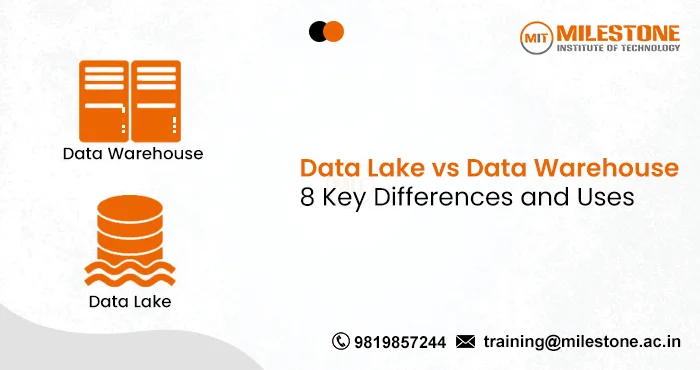When we think about data management there are two terms which are most commonly searched and used – Data Lake and Data Warehouse. Though they have different purposes and satisfy different needs, both are absolutely essential parts of a data strategy. Knowing their differences will enable companies to decide on their data architecture with understanding. The main difference between
Data Lake vs Data Warehouse, their advantages, applications, and more are discussed in this blog.
What is a Data Lake?
A
data lake is a centralized, large-scale storage system for both structured and unstructured data. Data Lakes store raw data in its natural form until it is needed unlike conventional data storage systems. Big data and real-time analytics are supported by this method, which helps data scientists and analysts to run complex searches and apply machine learning without preprocessing data requirements.
Key Features of Data Lakes:
- Scalability: Capable of handling huge amounts of data from multiple sources.
- Flexibility: Stores data in its raw form, allowing for different data types and formats.
- Cost-Effectiveness: Often cheaper to implement compared to traditional storage solutions due to the use of commodity hardware and open-source software.
What is a Data Warehouse?
A
data warehouse is a specialized system which is utilized for data analysis and reporting. It compiles information from different sources into a structured format that is ideal for reporting and querying. High data quality and consistency are ensured by the usual processing and cleaning of data in a data warehouse before storing.
Key Features of Data Warehouses:
- Structured Storage: Users can easily make queries by organizing data into schemas and tables.
- Optimized for Performance: Designed to manage extensive reporting and challenging queries.
- Data Quality: Data is cleaned and transformed before being loaded, ensuring accuracy and consistency.
Difference Between Data Lake and Data Warehouse (Data Lake vs Data Warehouse)
Essential differences exist between a data lake vs data warehouse, as mentioned below:
| Feature |
Data Lake |
Data Warehouse |
| Data Type |
Structured, semi-structured, and unstructured |
Structured only |
| Data Storage |
Raw and unprocessed |
Processed and cleaned |
| Schema |
Schema-on-read |
Schema-on-write |
| Flexibility |
High flexibility in data types |
Limited to predefined schemas |
| Performance |
Optimized for big data and ML |
Optimized for query performance |
| Cost |
Generally lower cost |
Generally higher cost |
| Data Processing |
Late-stage processing (on-demand) |
Early-stage processing (pre-load) |
| Use Cases |
Real-time analytics, data science |
Business intelligence, reporting |
Benefits of Data Lake and Data Warehouse
Data Lake Benefits:
- Scalability: Can easily scale to accommodate growing data volumes.
- Flexibility: Supports various data types and formats, enabling diverse analytical processes.
- Real-Time Processing: Facilitates real-time data ingestion and processing, making it ideal for live data analytics.
- Cost Efficiency: Lower initial setup costs and maintenance compared to traditional systems.
Data Warehouse Benefits:
- High Performance: Optimized for fast query performance and complex reporting.
- Data Integrity: Ensures high data quality through pre-processing and cleaning.
- Structured Analysis: Provides a well-organized environment for structured data analysis and business intelligence.
- Consistency: Offers a single source of truth by consolidating data from multiple sources.
What are the Use Cases for Data Lake and Data Warehouse?
Use Cases for Data Lake:
- Big Data Analytics: Ideal for handling large volumes of unstructured and structured data.
- Data Science and Machine Learning: Facilitates advanced analytics and modeling using diverse datasets.
- Real-Time Data Processing: Suitable for applications requiring real-time data analysis, such as IoT and streaming data.
- Data Integration: Acts as a central repository for integrating data from various sources without needing immediate processing.
Use Cases for Data Warehouse:
- Business Intelligence: Provides a structured environment for generating reports and dashboards.
- Historical Data Analysis: Suitable for analyzing historical data and generating trend reports.
- Structured Reporting: Ideal for organizations that need reliable, high-quality data for regulatory reporting and compliance.
- Operational Reporting: Supports operational decision-making through structured and consistent data.
Where to Learn a Complete Data Science Course?
You might be thinking where to gain these skills and build a career? There are many institutes or training centers where you can learn
data science courses, but as per the reviews and students recommendation Milestone institute of technology provides IT courses, Engineering courses, Graphic Designing Courses in which they provide practical training, personal guidance, and many more for students empowerment and career success. They provide comprehensive courses covering various aspects of Analytics, and data science.
Frequently Asked Questions
Can a Data Lake replace a Data Warehouse?
No, Data Lake cannot totally replace a Data Warehouse. While Data Lakes give flexibility and scalability for managing a range of data types, Data Warehouses are made to manage structured data and difficult searches. Many companies mix the two to best leverage their benefits.
How do I decide between using a Data Lake and a Data Warehouse?
The choice is based on your company’s needs. If you need scalable storage for a range of data kinds and flexible analytics, a data lake is your best choice. Structured data, high-performance searches, and business intelligence are better suited for a data warehouse.
Can we use both data lakes and warehouses together?
Yes, data warehouses and data lakes can be used in concert in a complimentary manner. Raw data can be stored in data lakes; structured, high-performance querying and reporting can be accomplished in data warehouses. This hybrid strategy lets companies make use of both systems’ strengths.




